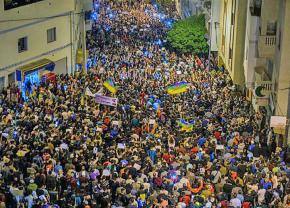Morocco continues to rise up
Last year, protests erupted against the regime of Morocco's King Mohammed VI when a street vendor was crushed to death in a garbage truck during a confrontation with police. The demonstrations have continued to escalate through the northern Rif region, including a general strike that took place in June, despite a crackdown by the state. Syrian socialist author and activist describes the ongoing struggles in Morocco in a report originally published at International Viewpoint.
POPULAR MOBILIZATION in the Moroccan Rif continued through June 2017 and has spread to several of the country's towns, despite repression by security forces and the regime's attempts to discredit the movement. Meanwhile, several thousand police officers have been sent to Al Hoceima to stop the demonstrations.
On June 2, a general strike was launched from the town of Al Hoceima at the initiative of al-Hirak al-Shaabi [the Popular Movement] against the authoritarian policies of the government and for the release of imprisoned activists of the movement--in particular Nasser Zefzafi, a popular leader arrested on May 29 under the pretext that he had, three days earlier, interrupted the imam's sermon in the mosque relaying the regime's propaganda accusing the demonstrators of sowing "fitna" (discord) in the country. Since then, demonstrators have boycotted prayers in the pro-regime mosques. This strike day was marked by numerous confrontations between demonstrators and the repressive forces of the state.

On June 5, two leading members of al-Hirak were arrested: Nabil Ahamjik, considered to be the movement's number two, and Silya Ziani, one of the new figures involved in the demonstrations. Nawal Ben Aïssa, a high profile figure in the movement, was also questioned by the police on June 7. Another leader, El Mortada Amrachaa, was arrested in Al Hoceima on the evening of June 10, before being released on bail on June 23. Several journalists have been arrested. Some of the detainees have launched a limited hunger strike.
These arrests only fed the anger of the several thousand demonstrators who meet every night in Al Hoceima and the surrounding area. There have been more than 120 arrests since the beginning of the protest. Sentences of up to 18 months imprisonment have been handed down against 40 detainees and 18 others have been released on bail. An intervention by dozens of police in riot gear on the beaches of Al Hoceima to dissuade bathers from chanting slogans in favor of al-Hirak has gone viral on social networks.
THE MOVEMENT of popular protest has spread to several other cities, including Rabat, Casablanca and Tangiers, in the form of demonstrations and strikes to denounce social and economic marginalization following the appeal of some political parties, trade unions and human rights organizations.
Demonstrations in solidarity with the popular movement in the Rif and its demands have also subsequently been organized in Rabat and other big cities. An appeal for an initiative centralized in Rabat has been launched in this context with the slogan "We are one country, one people, all against the Hogra." [The term used to refer to the regime's contempt for the people.] This initiative has been supported by a broad spectrum of political forces from the activist sectors of the social movement, the non-governmental left, radical left forces, the independent Islamist opposition, human rights associations, local co-ordinations in support of the Rif, and Amazigh movements.
The objective was to counteract the propaganda of the regime against the accusations of separatism of the movement in the Rif, and to center the struggle on the themes of "Hogra" and social questions, solidarity with the popular mobilization in the Rif and demanding the release of the political prisoners and the end of repression. In addition to these objectives, the opportunity to build a movement on a national scale was also on the agenda. The demonstration organized by the committee of detainee's families was a real success with a participation of between 100,000 and 150,000 people. We should also note the massive role played by women in the mobilizations.
The revolt is then far from over, and the determination of the demonstrators in the Rif persists. Solidarity is developing progressively throughout the country, despite the attempts of the Moroccan monarchy to prevent a snowball effect in the country. Extending the struggle is the key to the success and survival of the movement.
It is moreover in this climate of continuation of popular mobilizations that the forces of order have begun a "progressive" withdrawal from symbolic public places in Al Hoceima and Imzouren, interpreted as a sign of a softening by the authorities.
Solidarity with the struggles for freedom and dignity!
First published at International Viewpoint.


